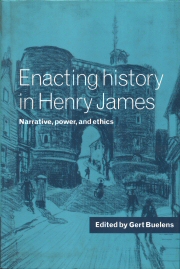Book contents
- Frontmatter
- Contents
- Notes on contributors
- Acknowledgments
- List of abbreviations
- Introduction
- 1 Power relations in the novels of James: the ‘liberal’ and the ‘radical’ version
- 2 Multiple germs, metaphorical systems, and moral fluctuation in The Ambassadors
- 3 James and the ethics of control: aspiring architects and their floating creatures
- 4 James and the shadow of the Roman Empire: manners and the consenting victim
- 5 ‘What Maisie knew’: Henry James's Bildungsroman of the artist as queer moralist
- 6 The double narrative of ‘The Beast in the Jungle’: ethical plot, ironical plot, and the play of power
- 7 Homoeroticism, identity, and agency in James's late tales
- 8 ‘A provision full of responsibilities’: senses of the past in Henry James's fourth phase
- 9 Possessing the American scene: race and vulgarity, seduction and judgment
- 10 History, narrative, and responsibility: speech acts in ‘The Aspern Papers’
- Index
9 - Possessing the American scene: race and vulgarity, seduction and judgment
Published online by Cambridge University Press: 02 February 2010
- Frontmatter
- Contents
- Notes on contributors
- Acknowledgments
- List of abbreviations
- Introduction
- 1 Power relations in the novels of James: the ‘liberal’ and the ‘radical’ version
- 2 Multiple germs, metaphorical systems, and moral fluctuation in The Ambassadors
- 3 James and the ethics of control: aspiring architects and their floating creatures
- 4 James and the shadow of the Roman Empire: manners and the consenting victim
- 5 ‘What Maisie knew’: Henry James's Bildungsroman of the artist as queer moralist
- 6 The double narrative of ‘The Beast in the Jungle’: ethical plot, ironical plot, and the play of power
- 7 Homoeroticism, identity, and agency in James's late tales
- 8 ‘A provision full of responsibilities’: senses of the past in Henry James's fourth phase
- 9 Possessing the American scene: race and vulgarity, seduction and judgment
- 10 History, narrative, and responsibility: speech acts in ‘The Aspern Papers’
- Index
Summary
Henry James studies today are as vibrant as they have ever been. Yet, no matter how great the fascination with the Jamesian text, a large number of readers cannot get rid of a sense of shame at their enjoyment of it. They feel that reading James is something of an evasion of the real work of the world. If earlier generations located that guilty feeling within the ivory tower that James's formal experimentation offered them, a technically more blase generation has associated its unease more often with the politically ambiguous, or plainly incorrect, stance the Master adopts. This is particularly true with regard to The American Scene, at present one of the hottest texts in James studies. Noting ‘the commonplace racial slurs punctuating’ that text, Bryan Washington, for instance, has a hard time resisting the book's ‘liberal, eminently civilized voice, sometimes sustained for pages at a time, [that] becomes so seductive, so powerful, that we forget (or want to forget) about the racial slurs, the cultural stereotypes …’. Washington regrets that the primary subject of his book, James Baldwin, succumbed to the seduction and appeared to undertake an ‘iterative valorization’ of Henry James throughout his work. ‘If such writing [as The American Scene's] is representative, symptomatic of James's nativism and of his elitism, then why did Baldwin, by contrast a progressive, bother to read him at all?’ Implicitly admitting an inability to come up with a satisfactory reply, Washington writes: ‘ There can be only speculation here, but … Baldwin almost certainly gave James the benefit of the doubt.’
- Type
- Chapter
- Information
- Enacting History in Henry JamesNarrative, Power, and Ethics, pp. 166 - 192Publisher: Cambridge University PressPrint publication year: 1997

